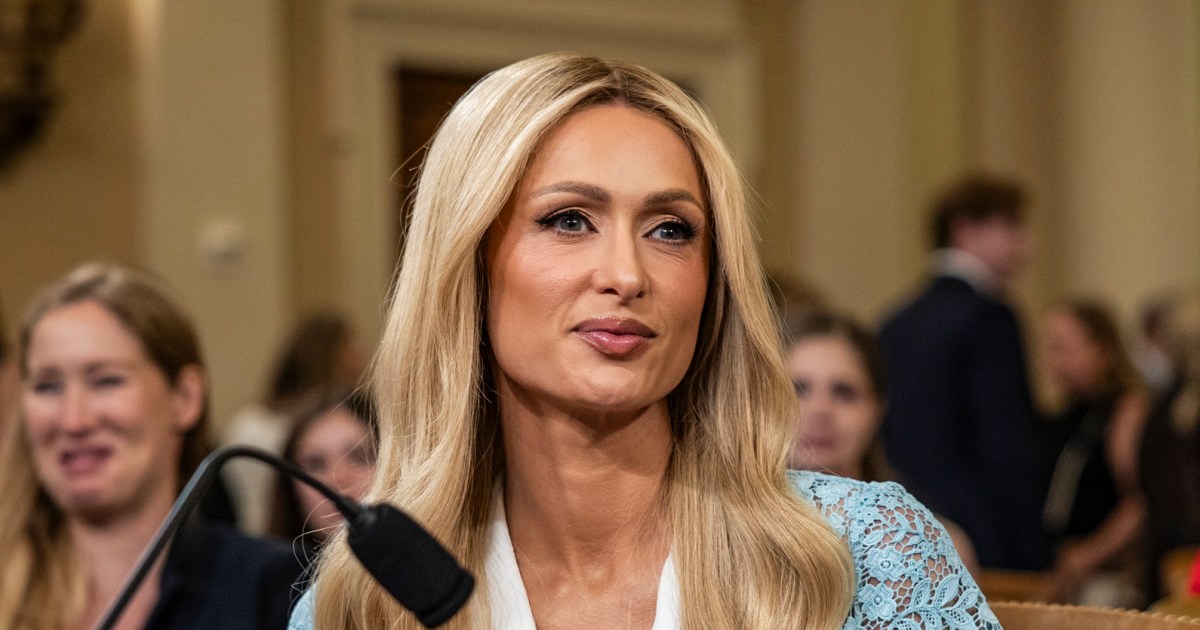
Paris Hilton described traumatic abuse during her time at a residential youth treatment facility in public testimony Wednesday before a House committee, urging lawmakers to institute laws that would protect vulnerable children.
Hilton, whose great-grandfather founded Hilton Hotels, advocated for federal oversight over such facilities and described her own experience with them. She told the House Ways and Means Committee she was 16 when she was taken from her bed in the middle of the night and transferred to such a center.
At the time, Hilton was struggling with attention-deficit/hyperactivity disorder, getting poor grades and skipping classes. Someone recommended to her parents that she be sent to a treatment facility for kids.
“These programs promised ‘healing, growth and support’ but instead did not allow me to speak, move freely or even look out a window for two years,” Hilton said. “I was force-fed medications and sexually abused by the staff. I was violently restrained and dragged down hallways, stripped naked and thrown into solitary confinement.”
Hilton described her parents as having been “completely deceived” about her treatment at the Provo Canyon School.
“My parents had no idea; they just thought it was going to be a normal boarding school,” she said. “And when I got there, there was no therapy. We would just constantly be torn down, abused, screamed at, yelled at. No education whatsoever. I learned nothing there except trauma.”
The Department of Health and Human Services’ inspector general’s office said in a report Wednesday that many states are failing to track how frequently children in foster care facilities are abused, sexually assaulted or improperly restrained, leaving them vulnerable to mistreatment.
Federal taxpayers spend billions of dollars on foster care for thousands of children around the country. Some children are placed with families in homes or with their relatives. The most expensive care, which can cost hundreds of dollars a day or more, involves residential treatment facilities — essentially group homes for children. Those children sometimes have complex medical or behavioral needs.
Hilton, 43, said she was testifying to be “the voice for children who currently do not have one.”
“For children who do end up in foster care, we cannot allow them to grow up in facilities,” she told the committee. “The treatment these children have had to endure is criminal. These kids deserve to grow up in safe, family-centered environments.”
She referred to a school for troubled boys in Jamaica, where students accused staffers of rampant abuse that included beatings and starvation. The U.S. pulled seven American children from the school in March, and five staffers have since been charged with child cruelty.
Hilton traveled to Jamaica to support and meet with the boys, telling the committee she worked to find them appropriate placements.
In a 2022 opinion column published in USA Today, Hilton alleged that as a teen she was repeatedly forced out of her bed at night for gynecological exams against her will. She described being “almost naked” in a cinderblock room used for solitary confinement.
Hilton wrote that it “isn’t treatment; it’s torture.”
“It takes all my courage to talk about it, but I couldn’t stand knowing that children as young as 8 years old are being sent to these ‘troubled teen’ programs by parents who don’t know and government agencies that don’t care,” she wrote.
Hilton has led protests calling for the Provo Canyon School to be closed, and she spoke to other former students of the institution in her 2020 documentary, “This is Paris.”
The Provo Canyon School said it was sold in 2000 and cannot comment on operations before then.
Two senators began inquiring about companies that own many such youth treatment centers in 2022, including the one that owns Provo Canyon School.